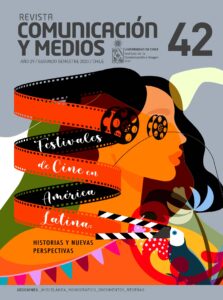Iniciativas de educación cinematográfica en los festivales de cine de Iberoamérica (2005 – 2019)
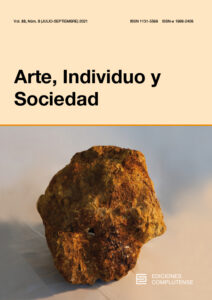 María Paz Peirano-Olate (Universidad de Chile) y Aida Vallejo Vallejo (Universidad del País Vasco UPV/EHU). María Paz Peirano-Olate (Universidad de Chile) y Aida Vallejo Vallejo (Universidad del País Vasco UPV/EHU).
DOI: https://doi.org/10.5209/aris.70186
Palabras clave: Educación cinematográfica/Alfabetización cinematográfica, festivales de cine, formación, jóvenes audiencias, realización
Resumen
El presente artículo analiza las políticas de educación cinematográfica implementadas por diversos festivales cinematográficos del espacio iberoamericano en el periodo 2005-2019. El objetivo es identificar y analizar diversas iniciativas de educación no formal dirigidas al desarrollo de dos aspectos de la alfabetización cinematográfica: (1) la creación de nuevas audiencias y (2) la capacitación de nuevos creadores/as y profesionales. El estudio combina el análisis cuantitativo, basado en la recopilación de datos (para el mapeo de festivales), con metodologías cualitativas, como la observación participante y la realización de entrevistas (para el análisis de prácticas y ejemplos concretos). La muestra analizada incluye 178 festivales del ámbito iberoamericano (120 generalistas y 58 especializados en audiencia joven/infantil), y ofrece ejemplos detallados de España y Chile. Los resultados muestran una proliferación y consolidación de (1) festivales especializados en jóvenes audiencias; y sesiones paralelas dedicadas al público infantil y juvenil en festivales generalistas; (2) actividades paralelas dirigidas a la capacitación de amateurs y profesionales. Los festivales cinematográficos se presentan, por lo tanto, como espacios idóneos para complementar el currículum educativo en diversos niveles, desde la educación primaria hasta el reciclaje profesional. De esta manera, se superarían los problemas que supone la inclusión de estos programas en el marco de la educación formal: lentitud en la adaptación de legislaciones vigentes, costes de implementación, necesidad continua de actualización de contenidos y formación del profesorado.
Agencias de apoyo: Proyecto “Festivales de Cine: experiencias de formación y expansión del campo cultural cinematográfico chileno”, Fondecyt nº11160735 de ANID (Agencia Nacional de Investigación y Desarrollo, Gobierno de Chile) y proyecto “IkerFESTS. Festivales de cine y audiovisuales en Euskal Herria”. EHUA16/31 (Universidad del País Vasco).
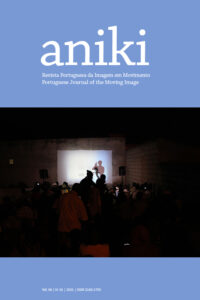
Número especial coordinado por Aida Vallejo y Tânia Leão.
Vol. 8 Núm. 1 (2021): Festivales de cine y sus contextos socio-culturales
Aniki. Revista Portuguesa da Imagem em Movimento
https://aim.org.pt/ojs/index.php/revista/article/view/789
Dossier temático
Introdução: Festivais de cinema e os seus contextos socioculturais
Tânia Leão, Aida Vallejo, 80-100. Em Português (Portugal). https://doi.org/10.14591/aniki.v8n1.789
Rafael Morato Zanatto. O I Festival Internacional de Cinema do Brasil (1954). 101-130. https://doi.org/10.14591/aniki.v8n1.728
Maria Paz Peirano. Festivales de cine en Chile: Configuración de campo y comunidades cinéfilas, 131-157. En castellano. https://doi.org/10.14591/aniki.v8n1.723
Tânia Leão. Para uma Análise dos Festivais de Cinema em Portugal: Génese, institucionalização e desafios, 158-192. Em Português (Portugal). https://doi.org/10.14591/aniki.v8n1.738
Fernando Redondo Neira. Novo Cinema Galego: Recepción crítica y presencia en festivales, 193-218. En castellano. ttps://doi.org/10.14591/aniki.v8n1.721
Juliana Muylaert. A Contribuição do Festival É Tudo Verdade ao Cânone do Documentário Brasileiro, 219-244. Em Português (Portugal). https://doi.org/10.14591/aniki.v8n1.718
Estrella Sendra. Banlieue Films Festival (BFF): Growing Cinephilia and Filmmaking in Senegal, 245-272. In English: https://doi.org/10.14591/aniki.v8n1.734
A special issue on Latin American Film Festivals has been just published by the Chilean academic journal Comunicación y Medios. Available open access here: https://comunicacionymedios.uchile.cl/ (articles in Spanish and English).
Acaba de publicarse el número especial sobre Festivales de cine en América Latina en la revista académica chilena Comunicación y Medios. Disponible en acceso abierto aquí: https://comunicacionymedios.uchile.cl/ (con artículos en castellano e inglés).
Tabla de contenidos:
read more / seguir leyendo / irakurtzen jarraitu…
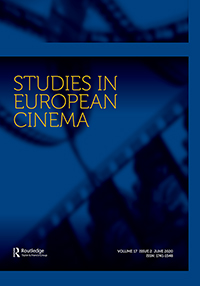 Vallejo, Aida (2020) “Rethinking the Canon: the Role of Film Festivals in Shaping Film History”. In Studies in European Cinema, 17(2), 155-169. Vallejo, Aida (2020) “Rethinking the Canon: the Role of Film Festivals in Shaping Film History”. In Studies in European Cinema, 17(2), 155-169.
https://doi.org/10.1080/17411548.2020.1765631
This article explores the intersections of festivals and film canons to vindicate the active role of the festival site in shaping film history.
The recent growth of film festival studies has demonstrated the importance of curatorial practices and alternative patterns of film circulation for the visibility to cinemas from non-hegemonic geo-political regions, to independent productions, as well as to minor genres (such as documentary or short film).
In this article, I propose revisiting film canons that conform classic film histories, through analysis of programming and awarding practices of key film festivals such as Venice or Cannes. I examine the influence that these events had on
(1) (re) defining film genres– such as documentary–,
(2) bolstering film movements and
(3) discovering cinemas and filmmakers from peripheral regions.
Finally, I argue that world cinema history can be better framed if we call for geolocated history(ies) of cinema, as a way to counter- balance the classic approaches to film history produced in hegemonic centres of academic production. In this context, film festivals are key players whose agency in the articulation of world cinema canons shouldn’t be underestimated.
https://doi.org/10.1080/17411548.2020.1765631
C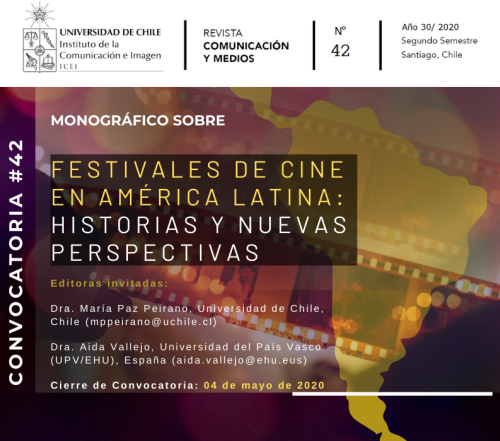 onvocatoria especial N°42 – Revista Comunicación y Medios: Festivales de Cine en América Latina onvocatoria especial N°42 – Revista Comunicación y Medios: Festivales de Cine en América Latina
Fechas convocatoria:
Inicio: 21/11/2019
Cierre: 18/05/2020
Se aceptan artículos originales en inglés y español que sean resultados de investigaciones originales.
Coimunicación y Medios se encuentra indexada en Clarivate (ISI) – ESCI; SciELO-Chile; DOAJ; ERIH PLUS; Latindex; Dialnet; REDIB; CLASE; MIAR; Latinoamericana; LatinREV
Editoras Invitadas:
Dra. María Paz Peirano, Universidad de Chile, Chile (mppeirano@uchile.cl)
Dra. Aida Vallejo, Universidad del País Vasco (UPV/EHU), España (aida.vallejo@ehu.eus)
read more / seguir leyendo / irakurtzen jarraitu…
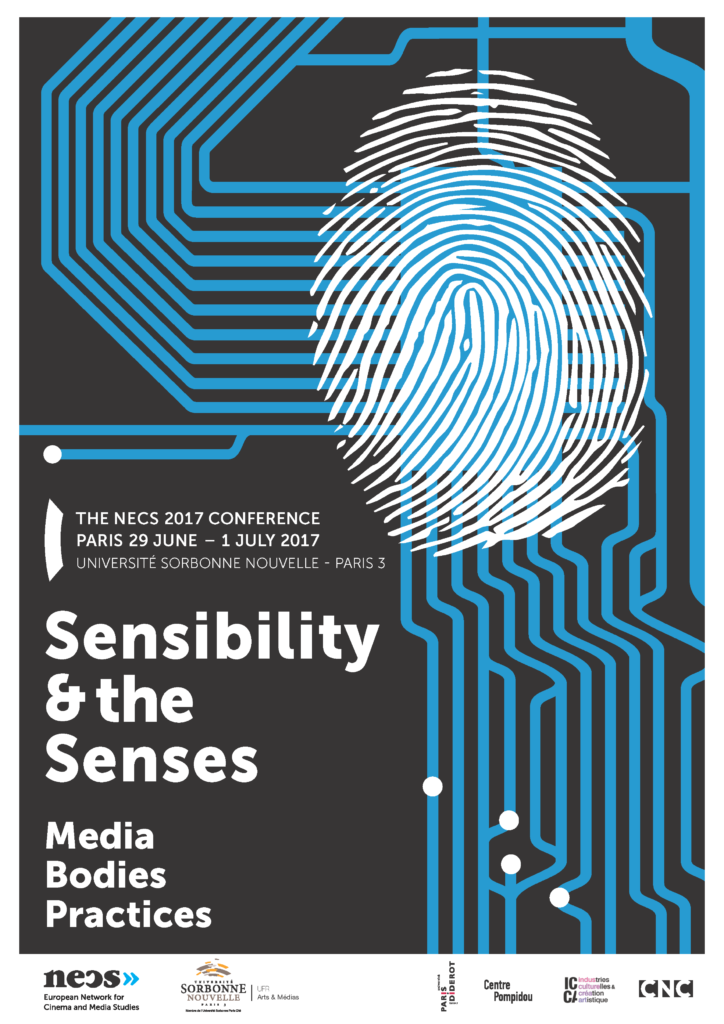 “From the Festival to the Museum: Expanded Formats in Documentary Film” [paper] “From the Festival to the Museum: Expanded Formats in Documentary Film” [paper]
NECS European Network for Cinema and Media Studies Conference. 30th June, 9:00-10:45. Paris, Université Sorbonne Nouvelle Paris 3.
Panel “Between Documentary and Experimental Realms: Avant-Doc, Past and Present.
Co-sponsored by the Workgroups “Documentary Film” and “Cinema & Contemporary Visual Arts”.
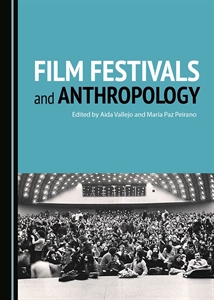 Film Festivals and Anthropology Film Festivals and Anthropology
Edited by Aida Vallejo and María Paz Peirano
See table of contents and intro here (free pdf):
www.cambridgescholars.com/film-festivals-and-anthropology
This collection explores the intersections between anthropology and film festival studies. Film and anthropology scholars map ethnographic film festivals and ethnographic approaches to festivals worldwide. The book provides a historical reconstruction of most of the main festivals exhibiting ethnographic film, considering the parallel evolution of programming and organisational practices across the globe. It also addresses the great value and challenges of ethnographic research tools for studying the wide-ranging field of film festivals.
This volume is the first to collect long-term experiences of curating and exhibiting ethnographic film, as well as new approaches to the understanding of film festival practices. Its contributions reflect on curatorial practices within visual anthropology and their implications for ethnographic filmmaking, and they shed light on problems of cultural translation, funding, festival audiences and the institutionalisation of ethnographic cinema.
The book offers a novel perspective on film festivals as showcases for cinema, socio-cultural hubs and distribution nodes. Aimed at anthropologists, media scholars, festival organisers and documentary film professionals, it offers a starting point for the study of ethnographic film exhibition within its cultural and social contexts.
Read reviews here:
Social Anthropology, 26:1 (2018): https://onlinelibrary.wiley.com/doi/full/10.1111/1469-8676.12458
Frames Cinema Journal: http://framescinemajournal.com/article/film-festivals-and-anthropology/
Zer, n42, 2017, pp. 249-250. https://ojs.ehu.eus/index.php/Zer/issue/view/1546/showToc
TABLE OF CONTENTS:
read more / seguir leyendo / irakurtzen jarraitu…
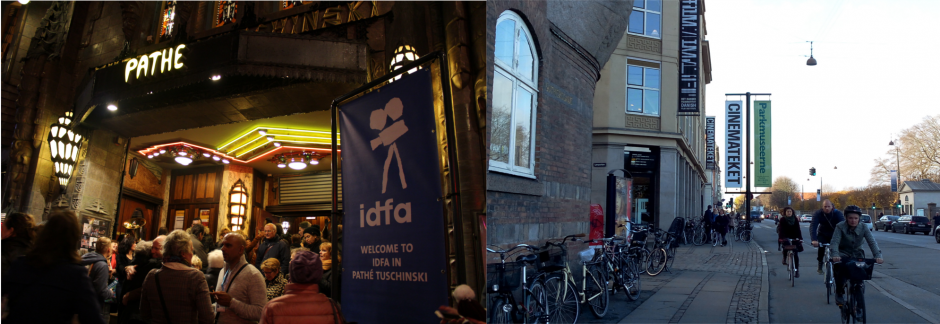 Aida Vallejo (2016) “Of calendars and industries: IDFA and CPH:DOX”, Aida Vallejo (2016) “Of calendars and industries: IDFA and CPH:DOX”,
Necsus. European Journal of Media Studies, 9, Spring 2016,
Amsterdam University Press. ISSN: 2213-0217.
See online (free): http://www.necsus-ejms.org/calendars-industries-idfa-cphdox/
Transnational Connections. Film Festivals and Documentary in Latin America and Spain [paper]
NECS conference 2016. The University of Potsdam, Campus Griebnitzsee, in Potsdam (Germany).
Panel A 12: Film Festivals in Latin America and Spain, Sponsored by Film Festival Research Workgroup. Thursday, 28.7.2016, 11:00-13:00 (27-30.July.2016)
Panel organized in collaboration with the research project ‘The transnational relations in Spanish-American digital cinema: the cases of Spain, Mexico and Argentina’ (CSO2014-52750-P), supported by the Spanish Ministry of Economy and Competitiveness.
Maria Paz Peirano (Leiden University): Training, Networks and Collaboration: Professionalising Latin American documentary film
Minerva Campos (Universidad Carlos III de Madrid): Film Research Through Digital and Online Resources: Working about European Festivals And Latin American Cinema
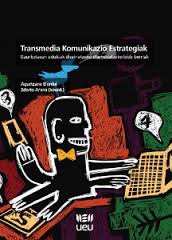 Aida Vallejo (2015) “Hedapen-sare berriak. Dokumental Inteaktiboa Transmedia-ingurunean”, Aida Vallejo (2015) “Hedapen-sare berriak. Dokumental Inteaktiboa Transmedia-ingurunean”,
Elordui Urkiza, Edorta Arana Arrieta (eds.) Transmedia Komunikazio Estrategiak: gaurkotasun-edukiak diseinatzeko eta hedatzeko bide berriak. Bilbao: UEU, pp. 71-95.
[Nuevas redes de difusión. El documental interactivo en el entorno transmedia -en Euskera- / New networks of circulation. Interactive documentary in transmedia contexts -in Basque-].
+info: Udako Euskal Unibertsitatea
read more / seguir leyendo / irakurtzen jarraitu…
|
|
 María Paz Peirano-Olate (Universidad de Chile) y Aida Vallejo Vallejo (Universidad del País Vasco UPV/EHU).
María Paz Peirano-Olate (Universidad de Chile) y Aida Vallejo Vallejo (Universidad del País Vasco UPV/EHU).
